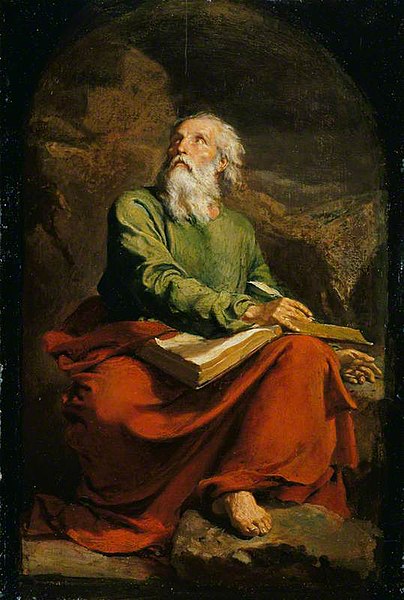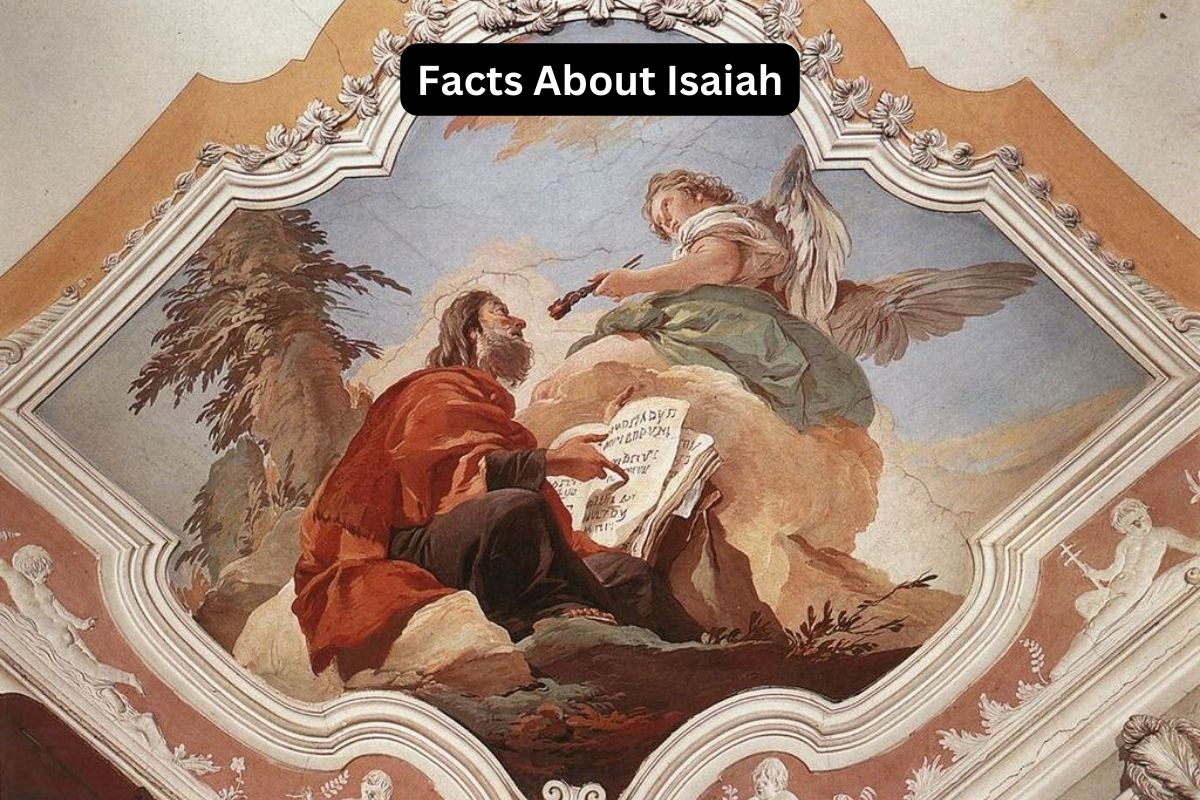Isaiah is a prominent figure in the Bible and is considered one of the major prophets. His name means “salvation of the Lord” and his prophecies are known for their poetic language and vivid imagery.
Isaiah lived in the 8th century BC during the reigns of four Judean kings:
- Uzziah
- Jotham
- Ahaz
- Hezekiah
He was a member of the upper class and had access to the royal court. This gave him a unique perspective on political and social issues, which he addressed in his prophecies.
Isaiah’s prophecies cover a wide range of topics, including judgment, redemption, and the coming of the Messiah. Some of his most famous prophecies include the virgin birth of Jesus, the suffering servant, and the restoration of Israel.
His writings have had a profound influence on both Jewish and Christian theology and continue to be studied and interpreted today.
Isaiah Facts
1. Old Testament Prophet
Isaiah is known as one of the major prophets of the Old Testament. He is believed to have lived in Jerusalem during the 8th century BCE and was a contemporary of other prophets such as Micah, Amos, and Hosea.
Also Read: Timeline of Isaiah in the Bible
Isaiah’s prophetic message was primarily directed towards the Kingdom of Judah and its rulers. He warned them about the consequences of their disobedience to God’s laws and the impending judgment that would follow. He also spoke about the coming Messiah and the restoration of Israel.
Isaiah’s prophecies were not only directed towards his contemporaries but also had a universal significance. His writings contain some of the most powerful and poetic expressions of God’s love, mercy, and justice.

2. Author of The Book of Isaiah
Isaiah was born in Jerusalem in the 8th century BCE and began his prophetic ministry around 740 BCE during the reign of King Uzziah. He continued to prophesy during the reigns of Jotham, Ahaz, and Hezekiah, and may have lived into the reign of King Manasseh.
Also Read: Ezekiel Timeline
Isaiah’s prophetic message was primarily directed towards the southern kingdom of Judah and its capital, Jerusalem. He warned the people of Judah about their sins and called them to repentance. He also prophesied about the coming of a Messiah who would bring salvation to Israel.
The Book of Isaiah is divided into two main sections: First Isaiah (chapters 1-39) and Second Isaiah (chapters 40-66). Some scholars believe that these sections were written by different authors, while others believe that they were written by the same author at different times in his life.
3. Messianic Prophecies
Isaiah is known for his Messianic prophecies, which foretell the coming of a savior who will redeem God’s people. These prophecies are scattered throughout the book of Isaiah and are some of the most significant in the Old Testament.
4. Servant Songs
One of the most famous Messianic prophecies in Isaiah is the Servant Songs, which describe a servant of God who will suffer for the sake of others. There are four Servant Songs in total, and they are found in Isaiah 42:1-9, 49:1-13, 50:4-11, and 52:13-53:12.
The Servant Songs describe a figure who is both a king and a sufferer, who will bring salvation to the world through his suffering.
The identity of the Servant is a matter of debate among scholars, with some believing that it refers to the nation of Israel as a whole, while others see it as a reference to an individual Messiah.

5. Addressed Political and Social Issues
Isaiah was not only a prophet but also a social and political commentator. He spoke out against the corruption and injustice of the ruling class and called for social and economic justice for all people.
Isaiah was particularly concerned with the plight of the poor and vulnerable in society. He called for the wealthy to share their resources with those in need and to treat the poor with dignity and respect. He also condemned the exploitation of workers and the practice of charging exorbitant interest rates on loans.
Isaiah also addressed political issues of his time, including the foreign policy of the ruling class. He warned against alliances with foreign powers and advocated for a policy of neutrality and non-intervention. He also denounced the use of military force as a means of resolving conflicts and called for peaceful solutions to political disputes.
6. Called for Repentance
Isaiah was called by God to deliver a message of repentance to the people of Israel. The prophet’s message was clear: the people needed to turn away from their sinful ways and return to God. Isaiah’s message was not well-received by the people, who were comfortable in their ways and did not want to change.
Isaiah’s message of repentance was not limited to the people of Israel. The prophet also spoke to the leaders of other nations, warning them of the consequences of their actions. In Isaiah 13-23, the prophet delivers messages of judgment against Babylon, Assyria, Philistia, Moab, Damascus, and Egypt.
Isaiah’s call for repentance was not just a call to turn away from sin. It was also a call to turn towards God. The prophet spoke of God’s love and mercy, and the blessings that would come to those who followed him. Isaiah’s message was not one of doom and gloom, but of hope and redemption.

7. Emphasized Zion and Jerusalem
Isaiah’s writings often emphasized the importance of Zion and Jerusalem to the Israelites. Zion was the hill on which the city of Jerusalem was built, and it was considered the holiest site in Judaism.
Isaiah believed that God had chosen Zion as his dwelling place, and that it was the center of his redemptive plan for Israel.
Isaiah envisioned a future in which Zion would be exalted above all other hills and nations would come to it to learn from God. He also prophesied that Jerusalem would be a place of peace and prosperity, and that it would be the capital of a restored Israel.
Isaiah’s emphasis on Zion and Jerusalem reflected his belief that God had a special relationship with Israel, and that he would ultimately redeem his people and restore them to their land.
This belief was a central theme of Isaiah’s prophecies, and it helped to shape the religious and political identity of the Israelites for centuries to come.
8. Had a Long Prophetic Ministry
Isaiah was one of the longest-serving prophets in the Bible, with a ministry that spanned over four decades.
He began his prophetic ministry in the year that King Uzziah died, which is estimated to be around 740 BC, and he continued to prophesy until at least 701 BC, during the reign of King Hezekiah.
During his long ministry, Isaiah delivered messages of warning and hope to the people of Judah. He spoke out against injustice, idolatry, and moral decay, and he called the people to repentance and faithfulness to God.
He also prophesied about the coming of the Messiah, the restoration of Israel, and the ultimate triumph of God’s kingdom.
Isaiah’s prophetic ministry was not without opposition. He faced hostility and persecution from the rulers and people of his day, and he was often ignored or rejected by those he sought to warn and encourage.
Despite these challenges, Isaiah remained faithful to his calling and continued to proclaim God’s word with boldness and conviction.
9. Lived During a Tumultuous Period in Israel’s History
Isaiah lived during a period of great turmoil in Israel’s history. He prophesied during the reigns of four different kings: Uzziah, Jotham, Ahaz, and Hezekiah. Each of these kings had their own unique challenges and struggles.
During the reign of Uzziah, Israel experienced a time of relative peace and prosperity. However, towards the end of his reign, Uzziah became prideful and tried to offer incense in the temple, a task reserved only for the priests. As a result, he was struck with leprosy and was forced to live in isolation for the rest of his life.
Jotham, Uzziah’s son, took over the throne and continued his father’s policies of peace and prosperity. However, towards the end of his reign, the kingdom of Israel began to experience external threats from the Assyrian empire.
Ahaz, Jotham’s son, faced even greater challenges during his reign. He was forced to deal with the threat of the Assyrian empire, which had already conquered much of Israel. In an attempt to save his kingdom, Ahaz made an alliance with Assyria, but this only made matters worse. The Assyrians eventually conquered Israel and took many of its people into captivity.
Hezekiah, Ahaz’s son, took over the throne and faced the daunting task of rebuilding Israel after the Assyrian conquest. He was a wise and righteous king, and under his leadership, Israel experienced a time of spiritual renewal and prosperity.
10. Tradition of Martyrdom
Isaiah is believed to have suffered a martyr’s death for his faith. The Jewish historian Josephus records that King Manasseh had Isaiah sawn in half with a wooden saw. This gruesome execution is also mentioned in the Talmud, a collection of Jewish writings.
The New Testament book of Hebrews also mentions the persecution of the prophets, including Isaiah, who “were sawn in two.” This suggests that the tradition of Isaiah’s martyrdom was well-known among early Christians.
The tradition of Isaiah’s martyrdom has been an important part of Christian and Jewish history. It has been celebrated in art and literature, and has inspired many to stand up for their faith in the face of persecution.
Despite the brutality of his death, Isaiah’s message of hope and redemption has continued to inspire people throughout the centuries. His prophecies of a coming Messiah have been fulfilled in the person of Jesus Christ, who is believed by Christians to be the Son of God and the Savior of the world.
